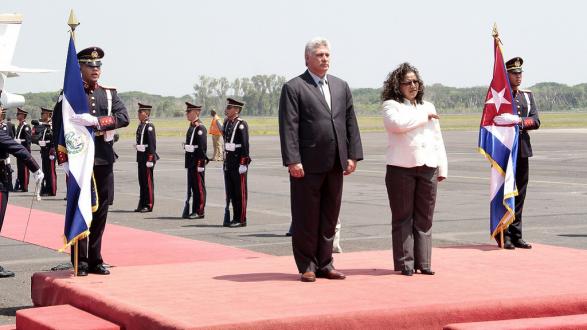In:
Global Beat is your weekly stop for news from around the world. Join us every Friday morning for important stories you should know about.
This week, Cuba gets its first non-Castro president since the revolution began; chemical attacks in Syria spark airstrikes and inspections; Brexit talks begin; and more.
____________________
Americas
For the first time since the Cuban Revolution in 1959, a Castro is not at the head of Cuba’s government. Raul Castro, brother to the late revolutionary leader Fidel, has stepped down and tapped Miguel Diaz-Canel to take his place. Raul Castro reiterated the need to modernize the economy and for other reforms as he stepped down, and will stay on as head of the Communist Party. Diaz-Canel is a consensus-builder, will likely continue supporting the direction of the Party, and will continue to work closely with Castro. Canada has recently pulled all diplomats out of Cuba citing a mysterious illness, just as the United States did at the beginning of the year.
Also check out:
Central & South Asia
According to the World Resources Institute, some Indian cities are heading for "Day Zero," just as Cape Town is, as water reservoirs shrink. More than 400 water districts will face mild to extremely dry conditions during India’s summer months, as there was a major rain deficit from January through April 11. One of India’s largest dams, Indira Sagar, is 33 percent below its average peak capacity, affecting dams and reservoirs beneath it, with one such reservoir providing drinking water to 30 million people. The regional government in Gujarat, where the dam is located, has asked farmers to halt irrigation and not plant crops.
Also check out:
China & East Asia
Current CIA director and nominee for Secretary of State Mike Pompeo met with North Korean dictator Kim Jong-un over Easter weekend as part of an effort to lay groundwork for the proposed upcoming meeting between President Trump and Kim. Trump has made it clear that the United States will go through with the proposed meeting, but he will walk away if the discussion is not "fruitful." South Korean President Moon Jae-in said that North Korea is committed to complete denuclearization with no preconditions that the United States cannot support, like pulling troops out of South Korea. According to Moon, North Korea wants an end to hostilities and a security guarantee for the state and the regime. The Trump administration has vowed to continue putting maximum pressure on North Korea.
Also check out:
Europe & Russia
The first round of discussions about the future relationship between the United Kingdom and the European Union following Brexit is now underway. President of the European Council Donald Tusk has said there will be no Brexit deal until the border issue between the Republic of Ireland and Northern Ireland is resolved. Meanwhile, EU leaders and diplomats seem relatively relaxed about negotiations, as Britain is doing all it can to ensure it leaves as intact as possible and with as little immediate disruption to the economy as possible upon leaving.
Also check out:
Middle East & North Africa
The United States, France, and the United Kingdom launched targeted airstrikes against chemical weapons facilities in Syria on April 13 in response to an alleged chemical weapons attack by the Syrian government against civilians and rebel groups. Inspectors from the Organization for the Prohibition of Chemical Weapons (OPCW) made it to parts of eastern Ghouta where the chemical weapons were allegedly used, but were fired upon and prevented from doing further investigation. The U.S. Department of State believes Russian and Syrian forces are working to "sanitize" inspection sites before OPCW inspectors gain access. The U.S. Department of Defense believes the Syrian government maintains a limited capability to use chemical weapons. The Syrian government is stepping up its efforts to crush remaining rebel enclaves, mainly in southern Syria. This push to the south could bring Syrian, Russian, and Iranian troops closer to the tense border with Israel and closer to U.S. military forces based in the east. Saudi Arabia has said they are willing to send troops to Syria as part of a wider U.S.-led coalition, and Iraq is stepping up air strikes against ISIL forces in Syria.
Also check out:
Southeast Asia & Oceania
Bangladeshi Prime Minister Sheikh Hasina has called for the international community to put more pressure on Myanmar to repatriate Rohingya refugees. Bangladesh and the United Nations rejected a claim by the Myanmar government that they had repatriated a Rohingya family and given them government ID cards—still not a form of citizenship. Bangladesh said the family they are referring to had not made it past a "no-man’s land" on the Myanmar side of the border, where 6,000 other refugees are. There are around 700,000 Rohingya refugees in Bangladesh.
Also check out:
- Chinese e-commerce giant Alibaba joins project to redevelop Thailand’s industrial eastern seaboard following ruling junta’s offer of incentives to foreign companies – The Wall Street Journal
Sub-Saharan Africa
Ethnic violence in Mali has driven 3,000 Malians into Burkina Faso in the past several weeks, according to the UNHCR. These new refugees add to the 24,000 Malians that have fled to Burkina Faso since the start of the conflict in 2012. Infrastructure is already overstretched, light rains over the past year have left over a million Burkinabe in need of food aid, and violent extremism is on the rise. UNHCR officials are urging new refugees to move to camps further from the border where they can be registered and receive food aid, and are hoping to limit further aggravating an already delicate situation.
Also check out:




